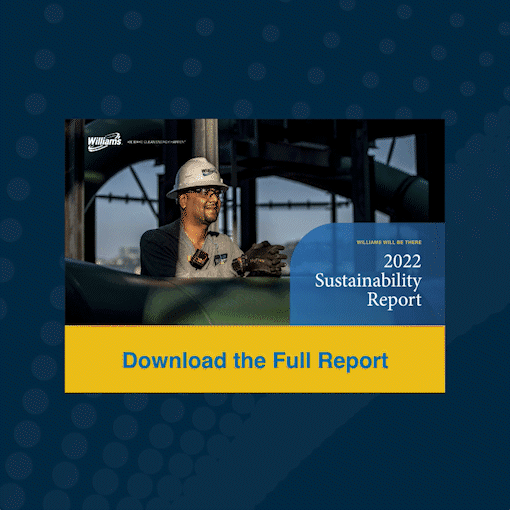Why This Matters to Williams
Growing our domestic and global reach to provide cleaner and reliable energy depends, in part, on our ability to garner support for energy infrastructure expansion. Federal, state and local legislative and regulatory developments affect our ability to maximize our existing operations and expand pipeline infrastructure. For example, barriers in the permitting process make obtaining permits to construct new pipelines increasingly difficult. This limits our ability to meet customer demand for affordable, reliable energy and prolongs the use of higher-emissions fuels. To serve our customers and drive a successful clean energy transition, Williams actively participates in the development of energy infrastructure policy by engaging with public officials and collaborating with industry partners.
Promoting sound energy policy also involves public education, since public policy is increasingly influenced by public perception. We encountered challenges at the local level in 2022, including policies banning natural gas. Such opposition heightens the need for Williams to continue educating our stakeholders on the importance and benefits of natural gas, particularly in relation to the low-carbon economy transition. For more information regarding our public perception efforts, please refer to the Stakeholder Engagement section.
Our Approach
Williams’ state government and regulatory affairs team engages with policymakers and other government stakeholders at the state and local levels to determine actions relative to our policy and regulatory agenda. We continue to take a bipartisan approach in our public policy outreach. In 2022, Williams presented on energy issues at both Democratic and Republican Governors Association meetings. Additionally, we continued using our comprehensive stakeholder management system to enhance our bipartisan engagement through newsletters and other corporate communications. This system allows us to better track support for the company initiatives that we implement.
We recognize that ESG issues are increasingly significant for federal legislators and regulators. In 2022, we engaged on various ESG issues, including energy reliability, environmental justice, cybersecurity preparedness and GHG emissions reductions. For example, Williams collaborated directly with FERC, Congress and industry associations to convey industry feedback to FERC’s proposed updates to its 1999 Policy Statement on the Certification of New Interstate Natural Gas Facilities. Through this engagement, we conveyed our concerns that the proposed policy introduces uncertainty and new challenges related to building natural gas infrastructure. As a result of our efforts, along with concerns raised by industry peers and a bipartisan group of elected officials, in March 2022 FERC shifted these policies to “draft” status and reinstated the 1999 policy.[1]
In 2022, we saw significant action related to energy policy. The Inflation Reduction Act (IRA) of 2022, signed into law by President Biden in August 2022, took an approach to energy that included industry-supported provisions on oil and gas leasing, Carbon Capture Storage (CCS) and hydrogen. Additionally, Williams engaged Congress in 2022 on the industry’s permitting reform priorities, but no legislation moved forward. These efforts will continue in 2023.
Williams also witnessed an increased federal focus on energy access, affordability and reliability for the industry, a direct result of Russia’s invasion of Ukraine. This conflict emphasizes the importance of domestic natural gas resources and LNG exports to meet the needs of our global allies. For example, in March 2022, the Biden Administration announced that the U.S. would collaborate with international partners to ensure sufficient LNG volumes for the European market, with expected increases moving forward.[2] For more information regarding how Williams is contributing to this effort, please refer to the Energy Access, Affordability and Reliability section.
Through our CEO’s leadership role on the National Petroleum Council (NPC), Williams was a contributing author to a report submitted by the NPC to the Secretary of Energy in December 2022. One focus of the report was to specifically address the role the Russian invasion of Ukraine has on the petroleum, natural gas, LNG and NGL markets. The report was one of two approved at the NPC’s December meeting.
Additionally, in 2022, our CEO was appointed to the President’s National Infrastructure Advisory Council which advises the White House on how to improve the security and resilience of the nation’s critical infrastructure sectors through the reduction of physical and cyber risks.
[2] WhiteHouse.gov, Fact Sheet: United States and European Commission Announce Task Force to Reduce Europe’s Dependence on Russian Fossil Fuels.
The crisis in Ukraine highlights the importance of reinforcing our nation’s natural gas energy infrastructure as a matter of national security. In support of democracy and climate goals around the world, the situation in Europe also highlights the need for greater U.S. liquified natural gas (LNG) exports. To deliver these benefits, efficient federal permitting for pipeline and LNG export infrastructure is essential.
ALAN ARMSTRONG, PRESIDENT & CEO
Political Contributions
Williams takes a bipartisan approach to our political contributions to support advancing our business and industry interests, including topics related to energy infrastructure modernization and permitting, hydrogen policy and hydrogen tax incentives. Before Williams contributes to candidate campaigns, our legal department reviews proposed contributions to confirm legal and regulatory compliance. Our governance and sustainability committee reviews our political contributions at least annually.
Williams’ nonprofit political action committee, WILLCO PAC, is registered with the Federal Election Commission. WILLCO PAC is an independent, nonpartisan entity that raises contributions from eligible Williams employees to support candidates for congressional and state offices, where permitted by law. Through contributions to WILLCO PAC, our employees support policies that enable the delivery of all forms of clean energy. Employee participation in WILLCO PAC is strictly voluntary. In addition to WILLCO PAC giving, in 2022, Williams made corporate political contributions to members of both political parties totaling $207,500.00.
We ensure our political actions and contract lobbyists comply with all applicable lobbying registration requirements. The Center for Political Accountability’s CPA-Zicklin Index measures political disclosure and accountability policies and practices for election-related spending by S&P 500 companies. In 2022, Williams was recognized as a “Trendsetter Company,” scoring over 90% on this comprehensive rating index for the fourth consecutive year.
We provide a link on our website to the Office of the Clerk for the U.S. House of Representatives, where our federal disclosures for lobbying activities are available, including our aggregate spending for lobbying and payments to lobbying service providers. Also included on our website are yearly political corporate contribution reports and reports of corporate fund expenditures to trade associations.
Industry Associations
Williams engages with a wide range of trade associations at the national, state and local levels. We find value in engaging with trade associations that share our positions on critical public policy issues but also engage with those that do not align with our public policy positions. The following are examples of trade associations and industry coalitions we engaged with in 2022:
- American Petroleum Institute
- American Society of Mechanical Engineers
- American Society of Safety Professionals
- Liquid Energy Pipeline Association
- The Business Roundtable
- Clean Hydrogen Future Coalition
- Coalition for Renewable Natural Gas
- Common Ground Alliance
- Differentiated Gas Coordinating Council
- Energy Infrastructure Council
- Global Carbon Capture and Storage Institute
- GPA Midstream Association
- Interstate Natural Gas Association of America
- Marcellus Shale Coalition
- National Society of Professional Engineers
- Northwest Gas Association
- Southern Gas Association
- Virginia Chamber of Commerce
- Virginia Manufacturers Association
- Virginia Oil & Gas Association
- Young Pipeline Professionals USA
Continued active membership and leadership roles in trade associations and industry coalitions help us amplify the industry voice and collectively work on public policy priorities. For example, Williams’ Vice President of New Energy Ventures is a founding board member of the Clean Hydrogen Future Coalition, which supports the adoption of hydrogen in the U.S.
Williams is a member of the Energy Infrastructure Council (EIC), and our Chief Financial Officer serves as co-chair of the board-level ESG Working Group. The member ESG Working Group meets regularly to discuss various ESG topics, trends, goal-setting and operationalization practices. Williams helped the EIC ESG Working Group launch the first-ever midstream ESG reporting template in December 2020, and in April 2022, the joint EIC and GPA Midstream ESG Working Group released version 2.0 of the template. This updated template is the product of an extensive review of best-practice ESG reporting among EIC member companies and the ESG reporting requirements from numerous critical stakeholders. It provides best-practice guidance to assist energy companies in their ESG journeys. Adoption of the template by midstream companies continues to grow as investors have expressed their support and demonstrate use of the ESG data provided in the template. For more information, see our environmental, social and governance website.
Williams discloses all expenditures of corporate funds used for nondeductible lobbying and political spending on our website.


